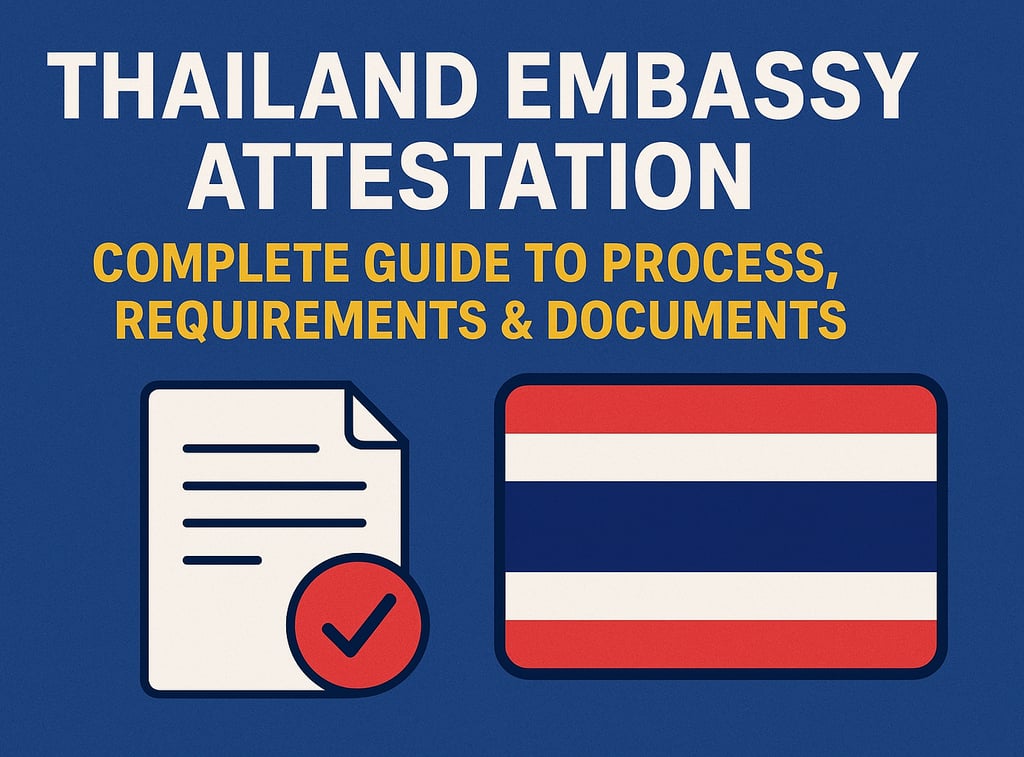Thailand Embassy Attestation: Complete Guide to Process, Requirements & Documents
8/18/20254 min read


Introduction to Thailand Embassy Attestation
Thailand embassy attestation is a crucial process for individuals and organizations requiring the validation of documents intended for use within the jurisdiction of Thailand. Document attestation refers to the authentication of various legal documents, affirming their authenticity and ensuring they meet the necessary legal standards. This procedure is pivotal for those engaging with Thailand's legal and administrative frameworks, as it proves the legitimacy of documents and eases their acceptance in various official capacities.
The necessity of embassy attestation arises in multiple contexts, including visa applications, educational enrollments, or employment opportunities in Thailand. Without this validation, documents may not be recognized or accepted by Thai authorities, potentially leading to complications or delays in administrative processes. Hence, individuals planning to utilize their documents within Thailand must undergo this attestation process to avoid legal pitfalls.
The process of obtaining Thailand embassy attestation is designed to maintain the integrity and authenticity of documents, including marriage certificates, academic records, and business-related papers. The Thai embassy or consulate acts as a reliable authority in this regard, ensuring that all submissions adhere to Thailand’s legal standards. This procedure typically involves multiple steps, including obtaining initial certifications from relevant government bodies, submitting documents to the embassy, and potentially undergoing further verification procedures.
In exploring the topic of Thailand embassy attestation further, this guide will delineate the specific requirements, necessary documentation, and step-by-step processes involved. By providing this comprehensive overview, we aim to equip readers with detailed knowledge that can help facilitate their interactions with Thai legal systems and ease the challenges often associated with document verification.
The Process of Attestation at the Thailand Embassy
Obtaining attestation from the Thailand embassy is a crucial step for individuals seeking to validate their documents for various purposes, whether for educational, professional, or immigration needs. The process involves several structured steps, ensuring that applicants are well-prepared and informed throughout. Initially, applicants are required to gather the necessary documents that require attestation. This typically includes original documents, photocopies, along with any supporting identification like passports or national IDs.
Once the documents are ready, the next step is to fill out an application form. This application is often available on the official website of the Thailand embassy or can be obtained directly from the embassy itself. It is essential to complete this form accurately, as discrepancies may lead to delays. After filling out the application, the documents must be submitted in person at the embassy or consulate. Some embassies may offer an online submission option; however, this is highly dependent on the specific location and their regulations.
Timing is another critical aspect of the attestation process. The duration for attestation can vary significantly based on the volume of applications the embassy is processing at that moment. Typically, applicants should allow anywhere from a few days to several weeks for their documents to be processed. It is advisable to plan accordingly, especially if the attestation is required for an impending deadline.
Furthermore, potential costs involved in the attestation process should not be overlooked. Fees may vary depending on the document type and the urgency of the service requested. It is recommended to check the embassy's website for the latest fee structure and payment methods accepted. Understanding these aspects will enable applicants to navigate the attestation process at the Thailand embassy with greater ease and confidence.
Requirements for Document Attestation
Document attestation at the Thailand embassy is a crucial step for individuals seeking to validate their documents for legal or official use in Thailand. Various types of documents can undergo this attestation process, which primarily includes educational certificates, marriage certificates, and commercial documents. Each type has specific requirements that must be fulfilled to ensure successful attestation.
When submitting educational certificates, applicants typically need to provide the original document along with photocopies. Additionally, a transcript of results, if applicable, and proof of enrollment or graduation may also be required. It is important that these certificates are duly signed and stamped by the educational institution prior to submission to the embassy.
For marriage certificates, applicants must submit the original certificate accompanied by a certified translation in Thai if the document is in another language. Furthermore, identification documents, such as a passport or national ID, are mandatory to verify the applicant's identity and link them to the marital status indicated in the marriage certificate.
In terms of commercial documents, such as business licenses or contracts, the embassy typically requires supporting documents that indicate the nature and validity of the transaction. This may include tax registration, company registration documents, and identification proof of parties involved in the business dealings. It is crucial to ensure that all submitted documents are original and bear official signatures or seals to be eligible for attestation.
Moreover, applicants must be prepared to pay a fee, which varies based on the type of document being attested. It is advisable to check the latest guidelines or consult the embassy's website for any changes in the requirements or procedures. Ensuring compliance with these criteria will streamline the attestation process, making it efficient and hassle-free.
Common Challenges and FAQs Regarding Thailand Embassy Attestation
The process of obtaining attestation from the Embassy of Thailand can be accompanied by various challenges that individuals may face. One frequent issue is miscommunication between applicants and embassy staff. It is essential for applicants to provide clear and comprehensive information regarding their documents to prevent misunderstandings, which could lead to delays or even rejections. Utilizing professional services can mitigate this risk by ensuring that all paperwork meets the embassy's stringent requirements.
Another significant challenge is the rejection of documents. This may occur if the submitted paperwork is incomplete, incorrectly formatted, or fails to meet the specific attestation criteria. To avoid such situations, individuals should thoroughly review the list of required documents outlined by the embassy prior to submission. Consistency in the names and details across all documents is also crucial, as discrepancies can lead to complications. Should documents be rejected, applicants are encouraged to seek clarification from embassy personnel to rectify the issues before reapplication.
Delays are another common concern in the attestation process. Factors such as high demand during peak seasons or unforeseen circumstances, like governmental changes or operational issues, can contribute to waiting periods. Applicants should plan accordingly, allowing extra time for processing. It is advisable to check the embassy's official website or contact them directly for the latest updates regarding processing times.
Frequently asked questions often include inquiries about the costs associated with attestation and the availability of additional services offered by the embassy. The fee structure can vary depending on the type of document and the urgency required; hence, confirming the latest fees beforehand is prudent. Additionally, the embassy may offer supplementary services that can streamline the attestation process, which can be beneficial for individuals unfamiliar with the procedure.
